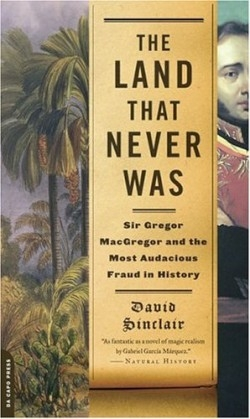The Land That Never Was
Sir Gregor MacGregor and the Most Audacious Fraud in History
Sir Gregor MacGregor (1786?1845), con man extraordinaire, was known for his “intemperate and unusual enjoyments.” Denied these, he might have made his name as a military officer, a liberator of Spain’s New World colonial possessions, or a promoter of British settlements in the Caribbean. Unfortunately, the egregious MacGregor seldom realized that cons have consequences. The author (also the able biographer of Edgar Allan Poe and Britain’s George I and II) demonstrates in this well-crafted tale that the greater the fraud, the greater the crash, and that reality seized is preferable to illusions lost. But, the skeptic can argue, MacGregor was not negligible-he lived long and lavishly on other people’s money.
MacGregor began well. Of middling Scottish family, he joined the army in 1803, slipped into a no-fee lieutenancy, married fashionably … and blew it, resigning in semi-disgrace. Seeking instant fame, he fought with General Miranda in Venezuela’s unsuccessful quest for independence before joining Bolivar, whose cousin he married. Numerous military adventures followed; however, MacGregor’s accounts of his performance (not devoid of courage) greatly outshone descriptions by neutral observers.
In 1820, after a decade of soldiering marked by increasing setbacks and decreasing prospects, MacGregor sought new horizons. He brilliantly reinvented himself as a monarch: “Cazique of Poyais.” This coastal strip, 500 miles south of Belize, was real, as were its swamps, dense woodland, and horrific climate. Unreal were the cities, army, civil service, trade, and cultivatable land, which MacGregor described in his loan prospectuses (beautifully written by Col. Strangeways, later by Mr. Goodluck). The London financial markets were hot, and the modest $200,000 Poyais loan sold, raising around $18 million in current money. The fate of the settlers, led to believe that loan proceeds would fund their start-up costs in dreamland, is a horror story, and MacGregor’s continued deception (he sought two more loans to ship additional settlers) reflects true depravity.
Speculative fever (that compound of greed, hope, and ignorance), is the primary driving force of this remarkable story: MacGregor and his clique-Poyais loan-brokers, shippers, humble emigrants-all banked on the big hit, and all were captured by their manipulator’s invincible optimism and unfailing ability to finesse unhelpful facts. As Sinclair demonstrates, contemporary political and commercial currents, the financial markets, and lack of any information assessment, all favored the scam. Tragically, no great indignation followed the revelation of death and misery; MacGregor, never successfully brought to justice, finally emigrated to Venezuela.
A map, illustrations, and chronology would have added to this attractive book. Scam enthusiasts should also see The Phantom Paradise: The Story of the Expedition of the Marquis de Rays (J. H. Niau, 1936), an equally horrific 1880s “new lands, new lives” tragedy.
Reviewed by
Peter Skinner
Disclosure: This article is not an endorsement, but a review. The publisher of this book provided free copies of the book to have their book reviewed by a professional reviewer. No fee was paid by the publisher for this review. Foreword Reviews only recommends books that we love. Foreword Magazine, Inc. is disclosing this in accordance with the Federal Trade Commission’s 16 CFR, Part 255.

